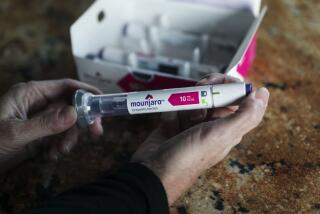Generic found as good as Vytorin
- Share via
The heavily advertised drug Vytorin is no better than an inexpensive generic drug at blocking the damaging effects of high cholesterol levels, according to new data released by the drug’s manufacturers Monday.
In a study of 720 patients funded by the manufacturers, Vytorin -- a combination of the drugs simvastatin and ezetemibe -- reduced levels of LDLs, the so-called bad cholesterol, by about 29% more than simvastatin alone. But it did not reduce the buildup of plaque in the coronary arteries -- a key indicator of progression toward heart disease.
The results indicated that the addition of ezetemibe -- which blocks the absorption of cholesterol in the intestines and is the key component that has turned Vytorin into a multibillion-dollar blockbuster -- produces no additional benefit.
“What a stunning reversal for this drug,” said Dr. Steven Nissen, a cardiologist at the Cleveland Clinic Foundation, who was not involved in the study. The new finding “suggests that Vytorin is simply . . . not useful. It should only be used as a last resort for patients who have failed every other drug.”
Even more surprising, the clinical outcomes among the patients in the trial were heading in the wrong direction, with slightly higher numbers of heart attacks, strokes and revascularizations (angioplasties or bypass procedures) among those taking Vytorin, even though the increases were not statistically significant.
“We hate to see these things going in the wrong direction,” said Dr. Karol Watson, a cardiologist at UCLA’s David Geffen School of Medicine, who was also not involved in the study and who admitted to perplexity about the findings.
“We believe that LDL reduction is the basis of improvements” from statin use, she said. “So my clinical gut feeling is, why didn’t it?”
“We definitely need an outcomes trial,” in which the number of patients is large enough to determine whether the drug has an effect on the number of heart attacks and strokes, Watson said.
Such a study, involving more than 10,000 patients, is currently underway, but results are not expected until 2011, said Skip Irvine, a spokesman for Merck & Co. and Schering-Plough Corp., which co-market the drug.
“Those results will give us real insight into the benefits the product does or does not offer,” he said.
One positive outcome of the new study was that it showed no apparent adverse effects associated with Vytorin, he added.
Some market analysts had feared that the drug might damage the liver. As a result of the safety finding, the companies’ stocks dropped modestly by the close of trading Monday: Merck’s stock dropped 1.3% to $59.78 per share, while Schering-Plough’s dropped 8% to $25.52.
Physicians wrote about 18 million prescriptions for Vytorin in 2006 and 14 million for ezetemibe, which is sold under the brand name Zetia, according to IMS Health, a healthcare information company. Vytorin costs nearly $3 per pill, compared to less than $1 for generic simvastatin.
Sales of the two drugs totaled an estimated $5 billion last year.
The trial was conducted by a group headed by Dr. John J.P. Kastelein of the University of Amsterdam Medical Center. The 720 subjects all suffered from a genetic disorder called heterozygous familial hypercholesterolemia, which affects about 0.2% of the population.
Those with the disorder have a tendency to accumulate very high levels of cholesterol in their blood. Patients in the study had a baseline level of LDL, technically known as low-density lipoprotein, in their blood of about 320 milligrams per deciliter -- about three times the normal level.
Vytorin reduced LDL levels by 58%, compared to a 41% reduction with simvastatin alone. The statins block synthesis of cholesterol in the liver.
In addition to measuring cholesterol levels, researchers used ultrasound to measure the thickness of plaque in three key arteries. They found that the average thickness of the carotid artery plaque increased by 0.0111 of a millimeter in patients taking Vytorin, compared to an increase of 0.0058 of a millimeter in the simvastatin group.
Results of the two-year study had originally been scheduled to be released in 2006, but the companies delayed them, saying that the analysis was extremely complex. At one point, the firms said they were going to change the study’s design to simplify analysis, but critics objected and the researchers returned to their original plans.
Last month, the U.S. House of Representatives’ Committee on Energy and Commerce launched an investigation into why the results had not been released sooner.
Critics had charged that the delays were the result of negative findings.
A spokesman for the committee said Monday that the investigation would continue despite the release of the data.
The researchers plan to present their data in March at a meeting of the American College of Cardiology.
Meanwhile, the results “raise some very interesting questions,” said Dr. P.K. Shah, a cardiologist at Cedars-Sinai Medical Center who was not involved in the study.
“Is the LDL hypothesis still alive and well after this?” he asked. “Despite a 17-percentage-point reduction in LDL, [Vytorin] did not produce any changes better than the single drug alone. Many of us had not quite expected it to be that way.”
Nissen said, however, that other effects of the statins may be more important than their cholesterol-lowering activity. He cited research published two years ago suggesting that their antiinflammatory properties may be key to reducing plaque.
An alternative possibility for Vytorin’s poor showing, he said, is that ezetemibe may block the uptake of an as-yet-unknown substance in the diet.
--





